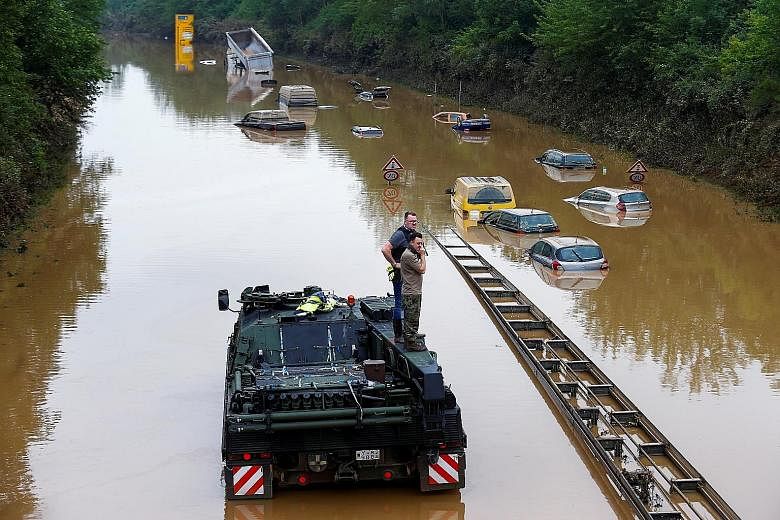BERLIN • Just days before roiling waters tore through western Germany, a European weather agency issued an "extreme" flood warning after detailed models showed storms that threatened to send rivers surging to levels that a German meteorologist said had not been seen in 500 or even 1,000 years.
By Friday, those predictions proved devastatingly accurate, with more than 130 people dead and 1,300 unaccounted for, as helicopter rescue crews plucked marooned residents from villages inundated sometimes within minutes, raising questions about lapses in Germany's elaborate flood warning system. Numerous areas were caught unprepared, victims and officials said, when normally placid brooks and streams turned into torrents that swept away cars, houses and bridges and everything else in their paths.
"It went so fast. You tried to do something, and it was already too late," a resident of Schuld told Germany's ARD public television, after the Ahr River swelled beyond its banks, ripping apart tidy wood-framed houses and sending vehicles bobbing like bath toys.
Extreme downpours like the ones that occurred in Germany are one of the most visible signs that the climate is changing as a result of warming caused by greenhouse gas emissions.
Studies have found that such floods are now happening more frequently for a simple reason: A warmer atmosphere can hold more moisture, generating more, and more powerful, rainfall.
But even as extreme weather events become increasingly common around the globe - whether wildfires in the American West, or more intense hurricanes in the Caribbean - the floods that cut a wide path of destruction through Germany, Belgium, Switzerland and the Netherlands last week were virtually unheard of, according to meteorologists and German officials.
Even so, they were not unforeseen.
"There should not have been so many deaths from this event," said Dr Linda Speight, a hydrometeorologist at the University of Reading in Britain, who studies how flooding occurs. She blamed poor communication about the high risk posed by the flooding as contributing to the significant loss of life.
For now, German politicians have made a point of not wanting to appear to be politicising a calamity. But the natural disaster had all the hallmarks of an event that has in the past reshaped political fortunes in German election seasons like this one.
Mr Armin Laschet, the Conservative leader of North Rhine-Westphalia, who is vying to succeed Chancellor Angela Merkel after national elections on Sept 26, told a news conference on Friday: "Our state is experiencing a flood catastrophe of historic scale."
German officials said that their warning system, which includes a network of sensors that measure river levels in real time, functioned as it was supposed to.
The problem, they said, was an amount of rain they had never seen before - falling so rapidly that it engorged even small streams and rivers not normally considered threats.
To describe the events of recent days as a 100-year flood would be an understatement, said Mr Uwe Kirsche, a spokesman for the German Weather Service, calling it a flood the likes of which had not been seen in perhaps a millennium.
"With these small rivers, they have never experienced anything like that," Mr Kirsche said. "Nobody could prepare, because no one expected something like this."
Last Tuesday, Mr Felix Dietsch, a meteorologist for the German Weather Service, went on YouTube to warn that some areas of south-west Germany could receive previously unimaginable volumes of rain. Up to 70 litres of water could pour down on an area of one cubic metre within a few hours, he warned.
NYTIMES

